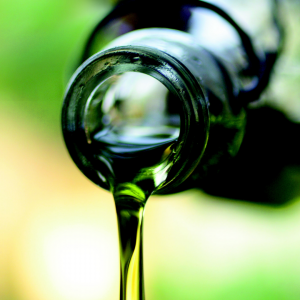The Truth About Polyunsaturated Fats


BiochemNordic
healthy versus unhealthy fats!
Polyunsaturated fats are liquid oils such as corn, canola (rapeseed), soy, safflower, sunflower, flaxseed (linseed), sesame, and peanut. Saturated fats are found in for instance coconut oil and butter.
We are told by health authorities and the media that eating polyunsaturated fats in place of saturated fats is healthy and protective against heart disease.
However, according to several researchers, including Dr. Ray Peat eating saturated fats has no negative effect on your heart and arterial health. Instead, it is the polyunsaturated fats that are unhealthy and damaging to good health.
According to many scientists and nutritionists including Dr. Ray Peat consumption of polyunsaturated fats is linked to obesity, cell aging, inflammation, and hormonal imbalances including hypothyroidism and insulin resistance (diabetes).
The Cholesterol myth
In the 1960 and 1970 people were eating a diet high in saturated fats including butter and coconut oil, people were lean and generally healthy. Then misleading research linked saturated fats to heart disease, which changed the diet recommendations to polyunsaturated fats.
It is true that eating saturated fats increase cholesterol, but there is no scientific evidence for connecting cholesterol to heart disease.
According to research heart disease and arteriosclerosis are caused by inflammation. Cholesterol is present in the injured artery as a protective molecule but is not the cause of arteriosclerosis. In our Hypothyroid Treatment Program, we go into more detail about cholesterol and heart disease.
The notion that cholesterol causes heart disease has been repeated over and over again, making people believe this misleading statement. The cholesterol myth has lead to diet recommendations where polyunsaturated fats are promoted as healthy foods and saturated fats are banned as unhealthy.
Prepared foods where saturated fats were used previously now contain polyunsaturated fats. Thus today the normal western diet is heavy in polyunsaturated fats with devastating health consequences for the population.
Polyunsaturated fats are unstable!
The structural difference between unsaturated and saturated fats gives them very different biological properties.
In saturated fats, the carbon atoms are bound together with single bonds. A single bond is very stable and non-reactive. In unsaturated fats, some of the carbon atoms are bound together with double-bonds. Double bonds introduces an open and unstable structure in the fat molecules.
Monosaturated fats have one double bond, whereas polyunsaturated fats contain more than two double bonds. The many double bonds in polyunsaturated fats make them very unstable and prone to chemical reactions [1].
polyunsaturated Fats create oxidative rancidity!
Because of the presence of several double bonds, polyunsaturated fats/oils are unstable and prone to chemical changes. One of these chemical changes is known as oxidative rancidity [1].
Oxidative rancidity involves the formation of free radicals from unsaturated fats, which then reacts with oxygen, forming a new free radical and so on ending with the forming of foul-smelling chemical compounds including ketones and aldehydes [1].
You might have noticed that liquid oils (which contain polyunsaturated fats) often smell foul. This is because they go rancid very quickly. This type of oil is not suitable for human consumption.
Even if the polyunsaturated oil is not rancid at the point of eating it, oxidative rancidity occurs easily in the human body, due to the body’s warm and oxygen-rich environment. When polyunsaturated fats are eaten they spontaneously oxidize; spreading free radical chain reactions inside the cells. The more unsaturated the fat/oil, the more vulnerable it to oxidative rancidity. [1]
Before the health industry started promoting polyunsaturated oils, these oils were used for paint, Polyunsaturated oils are great for paint but bad for your body!
polyunsaturated oils harm the body – especially the thyroid!
The free radical processes of oxidative rancidity processes harm cells in different ways, such as inhibiting their ability to produce energy and contribute to cell aging and inflammation [2].
Your thyroid function is especially vulnerable to the damage that occurs from consuming polyunsaturated fats. The polyunsaturated fats very powerfully inhibit thyroid function and thereby contribute to obesity and all the other symptoms of low thyroid function.
In our Hypothyroid Treatment Program, you can learn how polyunsaturated fats promote inflammation, suppress immune function, harm your digestive system, and lead to hormonal imbalances including hypothyroidism and insulin resistance.
What fats should I eat?
Due to the damage of polyunsaturated fatty acids, it is very important to limit their intake as much as possible. Limiting polyunsaturated fats from the diet is not easy though, as they are found in almost all types of foods to varying degrees.
In our Hypothyroid Treatment Program, you will learn how to identify polyunsaturated oil, so you can avoid them. You will also learn which foods are naturally high in polyunsaturated fats. The program also provides a list of healthy fats as well as important information on how you get rid of your fat stores of polyunsaturated fats in a safe way.
Thyroid supporting health advice
BiochemNordic specializes in providing essential diet and health recommendations for supporting your thyroid function and hormonal balance. Our recommendations are very different from other health advice and based on the research of Dr. Ray Peat, a leading thyroid expert. All our services are present in our shop. The Hypothyroid Treatment Program is our master product, which provides essential information not only on fat but also on which protein and carbohydrates are best for your thyroid. This program also contains information on many other important diets and health subjects, that will change the way you think about diet and health. You can learn more and get a full table of content of our Hypothyroid Treatment Program here!
Thyroid consultation
If you need personalized help implementing our diet and health recommendations, we are also available for online nutritional and metabolic consultation sessions.
Reference:
http://www.dynamicscience.com.au/tester/solutions1/chemistry/organic/Lesson3%20ranciditysoln.pdf
https://thyroidresearchjournal.biomedcentral.com/articles/10.1186/1756-6614-5-25


